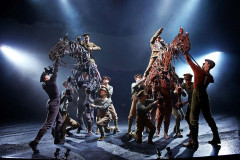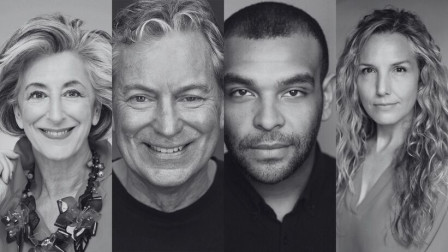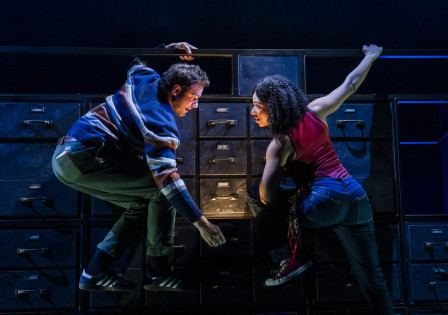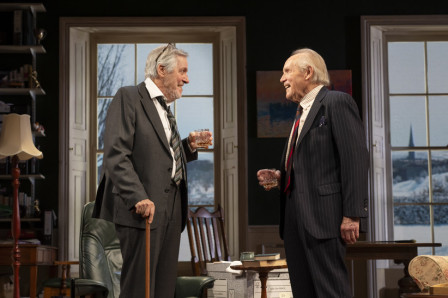London Theatre Commemorates the end of The First World War in Three Striking Productions
 Phil Willmott
12 November, 2018, 09:41
Phil Willmott
12 November, 2018, 09:41
 WAR HORSE is back at the National Theatre to commemorate the centenary of the end of the First World War and a night of theatre is the perfect way to contemplate the sacrifice millions made in that terrible conflict.
WAR HORSE is back at the National Theatre to commemorate the centenary of the end of the First World War and a night of theatre is the perfect way to contemplate the sacrifice millions made in that terrible conflict.
Based on Michael Morpurgo’s novel, WAR HORSE is about a horse requisitioned from rural England for the fighting in France and the farm boy who sets out to bring him home. The ordeal these two face is tear-jerking not just because the production effectively shows us the horror of what they faced but also because it portrays the hope man and beast carry in their heart through the darkness. The other thing which makes the production so memorable is the extraordinary puppetry. Life size horse puppets are manipulated with so much skill that you’ll believe within moments that you’re watching living, breathing creatures.
If you can’t get a ticket London also offers two less grandiose productions this week at which to thing about the sacrifice our recent ancestors made in WW1.
At the Arts Theatre you can watch Nick Newman and TV satirist Ian Hislop’s play THE WIPERS TIMES. I haven’t seen it yet but the press release describes it as “the true and extraordinary story of the satirical newspaper created in the mud and mayhem of the Somme, interspersed with comic sketches and spoofs from the vivid imagination of those on the front line”
It’s the story of how “in a bombed out building during the First World War in the Belgian town of Ypres (mispronounced Wipers by British soldiers), two officers discover a printing press and create a newspaper for the troops. Far from being a somber journal about life in the trenches they produced a resolutely cheerful, subversive and very funny newspaper designed to lift the spirits of the men on the front-line. Defying enemy bombardment, gas attacks and the disapproval of many of the top Brass, The Wipers Times rolled off the press for two years and was an extraordinary tribute to the resilience of the human spirit in the face of overwhelming adversity”
The Union Theatre in Southwark is currently home to the small-scale musical BRASS. In a five star review for the British Theatre Guide Jenifer Christie calls it a “a balanced, emotional and entertaining work with some of the best music I’ve heard in musical theatre”
The plot is described as “the story of a group of men from an amateur Leeds-based brass band who enlist to fight as part of the Leeds Pals regiment. They leave behind their wives and sweethearts who are left to pick up the pieces in the munitions factory. The women learn to play the instruments their brave men have left in the hope that one day they can play triumphantly to them on their return from war. Based on true stories, this heartfelt tale set between Leeds and the front line, is one of love, survival, loss, music and the futility of war”
It’s directed by my friend Sasha Regan who is brilliant at finding the true emotional heart of any musical and bringing out the best in young performers so it promises to be a very memorable evening.
There was a time when WW1 was too painful a subject for theatre to tackle. For a long while it was customary not to dwell on the horrors so many young men faced when they left their towns and villages for the first time to fight in terrible conditions for a pointless war that was based on outdated notions of patriotism.
All that changed in 1963 when the pioneering theatre maker Joan Littlewood devised a satirical show in which a group of seaside clowns performed sketches, juxtaposing WW1 life for ordinary people with the ludicrous political decisions made for them by war mongering politicians and generals. It was called OH, WHAT A LOVELY WAR and it provoked predictable outrage amongst those who wished to still believe wartime leaders acted honourably. But it was also an enormous hit with a public hungry for the truth. It transferred from its original East London venue to the West End and then to Broadway and into film. No one would ever regard the first world war in the same way again.
It’s wonderful that today’s theatre makers at The National, The Arts Theatre and the Union Theatre are carrying on the tradition of making enquiring, moving theatre about the Great War as we commemorate a hundred years since peace was declared.
Latest News

 Cast announced for the World Premiere of ALLEGRA
4 February 2026 at 15:02
Cast announced for the World Premiere of ALLEGRA
4 February 2026 at 15:02

 Cast announced for European premiere of THE JONATHAN LARSON PROJECT
4 February 2026 at 14:14
Cast announced for European premiere of THE JONATHAN LARSON PROJECT
4 February 2026 at 14:14

 Review: LOST ATOMS at Lyric Hammersmith
4 February 2026 at 12:08
Review: LOST ATOMS at Lyric Hammersmith
4 February 2026 at 12:08

 I'M SORRY, PRIME MINISTER at Apollo Theatre - Production images released
4 February 2026 at 10:41
I'M SORRY, PRIME MINISTER at Apollo Theatre - Production images released
4 February 2026 at 10:41